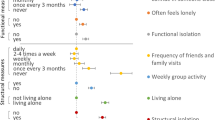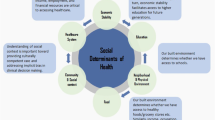Abstract
Purpose
The current study aims to examine the utilization of preventive health services in relation to social isolation among older Europeans adults.
Methods
Data on 5,129 adults 65 years of age and older was obtained from the first wave of the Survey of Health, Ageing and Retirement in Europe (SHARE, 2004/05). Prevalence of social isolation indicators (living arrangements, marital status, number of children, contact with children, proximity to children, activity participation, social exchange) was assessed in relation to preventive health services utilization, which was ascertained by a 12-item composite score (PHSUs). Estimations were based on the complex study design.
Results
Diverse facets of social isolation were differently associated to preventive care. Significantly lower mean PHSUs were found for adults living unpartnered, who were unmarried, had no children and were socially disengaged. A similar pattern was thus drawn regarding the clustering of social isolation indicators (4+). Considerable variations were detected across SHARE countries in the distribution of PHSUs among socially isolated adults.
Conclusion
Socially isolated individuals were found to receive fewer preventive services. This finding confers important evidence on the potential factors that affect the use of preventive health services among older adults. It is also suggestive of the need to develop public health and social policies with the aim to alleviate social isolation and as a means to enhance preventive care uptake in later life.


Similar content being viewed by others
References
Allin S, Masseria C, Mossialos E (2006) Inequality in health care use among older people in the United Kingdom: an analysis of panel data. LSE Health, The London School of Economics and Political Science, London
Ashida S, Hadley DW, Goergen AF, Skapinsky KF, Devlin HC, Koehly LM (2011) The importance of older family members in providing social resources and promoting cancer screening in families with a hereditary cancer syndrome. Gerontologist 51:833–842. doi:10.1093/geront/gnr049gnr049
Beckett MK, Elliott MN, Haviland AM, Burkhart Q, Gaillot S, Montfort D, Saliba D (2015) Living alone and patient care experiences: the role of gender in a National Sample of Medicare beneficiaries. J Gerontol A Biol Sci Med Sci 70:1242–1247. doi:10.1093/gerona/glv037glv037
Benjamins MR (2006) Religious influences on preventive health care use in a nationally representative sample of middle-age women. J Behav Med 29:1–16. doi:10.1007/s10865-005-9035-2
Borsch-Supan A, Brugiavini A (eds) (2005) The survey of health, ageing and retirement in Europe: methodology. Mannheim Research Institute for the Economics of Ageing, Mannheim, Germany
Borsch-Supan A et al (2013) Data resource profile: the Survey of Health, Ageing and Retirement in Europe (SHARE). Int J Epidemiol 42:992–1001
CMMS (2014) Centers for Medicare & Medicaid Services: National Health Expenditure Data. Retrieved from http://www.cms.gov/Research-Statistics-Data-andSystems/Statistics-Trends-and-Reports/NationalHealthExpendData/Downloads/tables.pdf. Accessed 1 Feb 2017
Cooke I, Mannix J (2009) Public health and the older person. In: Wilson F, Mabhala M (eds) Key concepts in public health. Sage, London, pp 261–266
Courtin E, Knapp M (2015) Social isolation, loneliness and health in old age: a scoping review. Health Soc Care Commun 25:799–812. doi:10.1111/hsc.12311
De Jong Gierveld J, Van Tilburg T, Dykstra P (2006) Loneliness and social isolation. In: Vangelisti A, Perlman D (eds) The Cambridge handbook of personal relationships. Cambridge University Press, New York, pp 485–500
Dickens AP, Richards SH, Greaves CJ, Campbell JL (2011) Interventions targeting social isolation in older people: a systematic review. BMC Public Health 11:647. doi:10.1186/1471-2458-11-6471471-2458-11-647
Dykstra PA (2009) Older adult loneliness: myths and realities. Eur J Ageing 6:91–100. doi:10.1007/s10433-009-0110-3
Fees BS, Martin P, Poon LW (1999) A model of loneliness in older adults. J Gerontol B Psychol Sci Soc Sci 54:P231–P239
Fernandez DM, Larson JL, Zikmund-Fisher BJ (2016) Associations between health literacy and preventive health behaviors among older adults: findings from the health and retirement study. BMC Public Health 16:596. doi:10.1186/s12889-016-3267-7
Fernandez-Martinez B, Prieto-Flores ME, Forjaz MJ, Fernandez-Mayoralas G, Rojo-Perez F, Martinez-Martin P (2012) Self-perceived health status in older adults: regional and sociodemographic inequalities in Spain. Rev Saude Publica 46:310–319
Ferrucci L, Giallauria F, Guralnik JM (2008) Epidemiology of aging. Radiol Clin N Am 46:643–652. doi:10.1016/j.rcl.2008.07.005S0033-8389(08)00127-9
Hoeck S, van der Heyden J, Geerts J, Van Hal G (2014) Preventive care use among the Belgian elderly population: does socio-economic status matter? Int J Environ Res Public Health 11:355–372. doi:10.3390/ijerph110100355ijerph110100355
Iecovich E, Biderman A (2013) Use of adult day care centers: do they offset utilization of health care services? Gerontologist 53:123–132. doi:10.1093/geront/gns036gns036
Katapodi MC, Facione NC, Miaskowski C, Dodd MJ, Waters C (2002) The influence of social support on breast cancer screening in a multicultural community sample. Oncol Nurs Forum 29:845–852. doi:10.1188/02.ONF.845-852
Kim ES, Strecher VJ, Ryff CD (2014) Purpose in life and use of preventive health care services. Proc Natl Acad Sci U S A 111:16331–16336. doi:10.1073/pnas.14148261111414826111
Kolstad JT, Kowalski AE (2012) The impact of health care reform on hospital and preventive care: evidence from Massachusetts. J Public Econ 96:909–929. doi:10.1016/j.jpubeco.2012.07.003
Lau DT, Kirby JB (2009) The relationship between living arrangement and preventive care use among community-dwelling elderly persons. Am J Public Health 99:1315–1321. doi:10.2105/AJPH.2008.151142AJPH.2008.151142
Linardakis M, Papadaki A, Smpokos E, Micheli K, Vozikaki M, Philalithis A (2015) Relationship of behavioral risk factors for chronic diseases and preventive health services utilization among adults, aged 50+, from eleven European countries. J Public Health 23:257–265. doi:10.1007/s10389-015-0683-6
Meyer RP, Schuyler D (2011) Old age and loneliness. Prim Care Companion CNS Disord 13:e1–e2. doi:10.4088/PCC.11f0117211f01172
Morales LS, Rogowski J, Freedman VA, Wickstrom SL, Adams JL, Escarce JJ (2004) Use of preventive services by men enrolled in Medicare+choice plans. Am J Public Health 94:796–802
Musa D, Schulz R, Harris R, Silverman M, Thomas SB (2009) Trust in the health care system and the use of preventive health services by older black and white adults. Am J Public Health 99:1293–1299. doi:10.2105/AJPH.2007.123927
Nelson T, Livingston G, Knapp M, Manela M, Kitchen G, Katona C (2002) Slicing the health service cake: the Islington study. Age Ageing 31:445–450
Ogden LL, Richards CL, Shenson D (2012) Clinical preventive services for older adults: the interface between personal health care and public health services. Am J Public Health 102:419–425. doi:10.2105/AJPH.2011.300353
Okoro CA, Strine TW, Young SL, Balluz LS, Mokdad AH (2005) Access to health care among older adults and receipt of preventive services: results from the behavioral risk factor surveillance system, 2002. Prev Med 40:337–343. doi:10.1016/j.ypmed.2004.06.009
Peng NB, Jensen GA (2016) Health shocks and initiation of use of preventive services among older adults. J Appl Gerontol 1–25
Schoen C, Osborn R, Huynh PT, Doty M, Zapert K, Peugh J, Davis K (2005) Taking the pulse of health care systems: experiences of patients with health problems in six countries. Health Aff (Millwood) Suppl Web Exclusives W5-509-25
Themessl-Huber M, Hubbard G (2006) Service use and prevention of emergency hospital admissions: a comparison of the views of older people and health and social care professionals. Res Policy Plan 24:165–178
Thorpe JM, Kalinowski CT, Patterson ME, Sleath BL (2006) Psychological distress as a barrier to preventive care in community-dwelling elderly in the United States. Med Care 44:187–191
Tomaka J, Thompson S, Palacios R (2006) The relation of social isolation, loneliness, and social support to disease outcomes among the elderly. J Aging Health 18:359–384. doi:10.1177/0898264305280993
Valtorta N, Hanratty B (2012) Loneliness, isolation and the health of older adults: do we need a new research agenda? J R Soc Med 105:518–522. doi:10.1258/jrsm.2012.120128105/12/518
Victor C, Scambler S, Bond J, Bowling A (2000) Being alone in later life: loneliness, social isolation and living alone. Rev Clin Gerontol 10:407–417
Vozikaki M, Linardakis M, Micheli K, Philalithis A (2016) Activity participation and well-being among European adults aged 65 years and older. Soc Indic Res 131:769–795. doi:10.1007/s11205-016-1256-y
Walker A (1993) Age and attitudes: main results from a Eurobarometer survey. Commission of the European Communities, Brussels
Zavaleta D, Samuel K, Mills C (2014) Social isolation: a conceptual and measurement proposal. University of Oxford, Oxford
Zavaleta D, Samuel K, Mills C (2016) Measures of social isolation. Soc Indic Res 31:367–391. doi:10.1007/s11205-016-1252-2
Author information
Authors and Affiliations
Corresponding author
Ethics declarations
Funding
This study was funded by the European Commission through FP5 (QLK6-CT-2001-00360), FP6 (SHARE-I3: RII-CT-2006-062193, COMPARE: CIT5-CT-2005-028857, SHARELIFE: CIT4-CT-2006-028812) and FP7 (SHARE-PREP: No. 211,909, SHARE-LEAP: No. 227,822, SHARE M4: No. 261,982). Additional funding from the German Ministry of Education and Research, the US National Institute on Ageing (U01_AG09740-13S2, P01_AG005842, P01_AG08291, P30_AG12815, R21_AG025169, Y1-AG-4553-01, IAG_BSR06–11, OGHA_04–064) and from various national funding sources is gratefully acknowledged (www.share-project.org). This paper used data from SHARE Waves 1 (DOIs: 10.6103/SHARE.w1.500).
Conflict of interest
The authors declare that they have no conflicts of interests.
Ethical approval
All procedures performed in studies involving human participants were in accordance with the ethical standards of the institutional and/or national research committee and with the 1964 Helsinki declaration and its later amendments or comparable ethical standards. This article does not contain any studies with human participants performed by any of the authors.
Informed consent
Informed consent was obtained from all individual participants included in the study.
Rights and permissions
About this article
Cite this article
Vozikaki, M., Linardakis, M. & Philalithis, A. Preventive health services utilization in relation to social isolation in older adults. J Public Health 25, 545–556 (2017). https://doi.org/10.1007/s10389-017-0815-2
Received:
Accepted:
Published:
Issue Date:
DOI: https://doi.org/10.1007/s10389-017-0815-2




